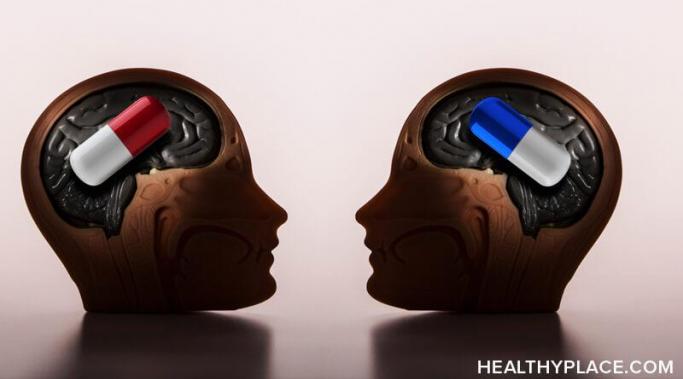It is common to have more than one mental illness at a time. Most people I know (from support groups) have multiple diagnoses. I have both paranoid schizophrenia and generalized anxiety disorder. I know people with schizoaffective disorder and obsessive-compulsive disorder (OCD). I also know of people with bipolar disorder and eating disorders. It is not rare to have a personality disorder along with schizophrenia, bipolar, or another diagnosis. People call it a dual diagnosis if someone has a substance abuse disorder and a mental illness.
Creative Schizophrenia
I have a tool in my toolbox for schizoaffective disorder that I haven’t written about before. The tool is earplugs.
In my experience, the worst part of schizophrenia is having episodes of psychosis. Losing touch with reality can be terrifying. For me, psychosis always involves hearing voices, delusions, and paranoia. I usually stop eating, which most likely makes the symptoms more severe. Complicating my experience with psychosis is a symptom called anosognosia.
My schizoaffective disorder tells me a lot of bad things about myself and makes me think I’m a bad person. Here are some of the ways that I feel like a bad person because of my schizoaffective disorder and how I fight back.
It's common knowledge that too much stress is bad for our health, but those of us with a mental health diagnosis can face another risk from stress, which is increased symptoms. As part of my self-care or lifestyle monitoring, I try to reduce how much stress I experience daily to manage anxiety and schizophrenia symptoms.
Since I have arthritis in my knees and schizoaffective disorder, the migraines I suffer are a substantial extra load. And now I know what it’s like to have my physical illnesses treated more seriously than my mental illness. This is the story of a time when I stood up for my mental health, and my mental illness was treated seriously.
It helps to know the difference between paranoia and anxiety. If I am experiencing paranoia, it involves delusions like someone is out to get me (suspicion and distrust) or has betrayed me. I frequently battle the delusion that someone is poisoning my food. My paranoia can cause anxiety, but the two do not have to be present together. My anxiety attacks often have ties to worry (like health concerns, the health of a loved one, public speaking, etc.), but not always. I can have an anxiety attack where I can't identify a triggering cause.
I was diagnosed with schizoaffective disorder, bipolar type, in 2002 (after a diagnosis of schizophrenia in 1999). But the anxiety that so often accompanies bipolar disorder and schizoaffective disorder has been with me since early childhood.
Psychosis (the presence of hallucinations and/or delusions) and anxiety can be difficult to deal with in relationships. Many symptoms can be confusing, frustrating, and challenging to those looking from the outside. When I have had breaks from reality (psychotic episodes), I have always treated my family and my spouse with suspicion due to paranoia. The paranoia often causes me to think that I am in danger around those who are the most supportive of me.
I think I’m on a very good medication cocktail. There are several reasons why, but the funniest one is that when I typed “medication cocktail” into my notes on my phone as a story idea, the predictable word “hour” appeared. I was able to see the humor in that, and when I told my husband, Tom, about it, he said, “Medication happy hour!” and we both laughed. Ain’t love grand?









